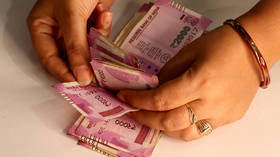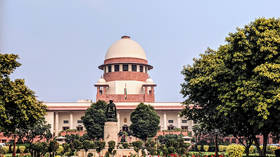Indian bank data links political parties to big donors ahead of polls
The Supreme Court earlier struck down a scheme that allowed confidential donations, and ruled that the details must be made public
India’s ruling party was the largest beneficiary of a now-abolished bond scheme through which companies were able to anonymously fund political parties, the election commission revealed on Thursday.
The Bharatiya Janata Party (BJP), led by Prime Minister Narendra Modi, received its biggest donation – amounting to nearly 6 billion rupees ($72 million) – from infrastructure firm Megha Engineering & Infrastructure, which also funded smaller parties through its subsidiaries.
Megha Engineering, based in Hyderabad, has won tenders for irrigation, water management, power, hydrocarbons, and transportation projects across India. The conglomerate also owns electric bus maker Olectra Greentech and has a technology partnership with Chinese firm BYD. According to the Financial Times, Olectra has been the biggest beneficiary of the federal government’s electric bus programme, and bagged contracts for over 8,000 buses, beating Indian top manufacturers such as Tata Motors and Ashok Leyland.
Overall, Megha Engineering emerged as the second biggest donor to purchase electoral bonds. The largest was the little-known Future Gaming Group owned by a south Indian ‘lottery king’ – which contributed a cumulative 13.6 billion rupees ($165 million) across political parties via the bonds scheme. A large chunk of its donations went to the All India Trinamool Congress (TMC) party, which is influential in the state of West Bengal.
The third largest donor via the scheme was Qwik Supply Chain Management, which, according to the Economic Times, is linked to India’s largest corporation, Reliance Industries. It donated around 4 billion rupees ($48 million), with the majority going to BJP and a smaller portion to Shiv Sena, a regional party in Mumbai.
Other large donors who made use of the bond scheme include mining conglomerate Vedanta Group and the telecoms firm Bharti Group, which purchased bonds worth around 2.3 billion rupees ($28 million) each. Their funds, too, went mainly to the ruling party.
Overall the BJP was the biggest beneficiary of the electoral bond program, according to the data unveiled by the election commission under orders from the Supreme Court, which abolished the scheme last month. The Modi-led party received over 60 billion rupees ($718 million) through these instruments from April 2019 until January of this year.
The country’s oldest and biggest nationwide opposition party, the Congress, as well as TMC, were among the next major recipients. They raked in 14 billion ($167 million) and 16 billion rupees ($191 million) in donations, respectively.
The Congress received the most funds from the Vedanta Group ($15 million) followed by electric distribution company Western UP Power Transmission ($13 million) and stainless steel trader, MKJ Enterprises ($8 million).
The electoral bond scheme was introduced by Modi’s government in 2018 with the stated objective of enhancing transparency in election funding. However, in February the scheme was struck down by the Supreme Court of India, which deemed it “unconstitutional.”
The funding revelations come just weeks before India’s 18th general election, beginning in April, in which over 970 million people will cast their votes to elect 543 members to the Lok Sabha, the lower house of parliament.
Where India Meets Russia – We are now on WhatsApp! Follow and share RT India in English and in Hindi
You can share this story on social media:









Comments are closed.